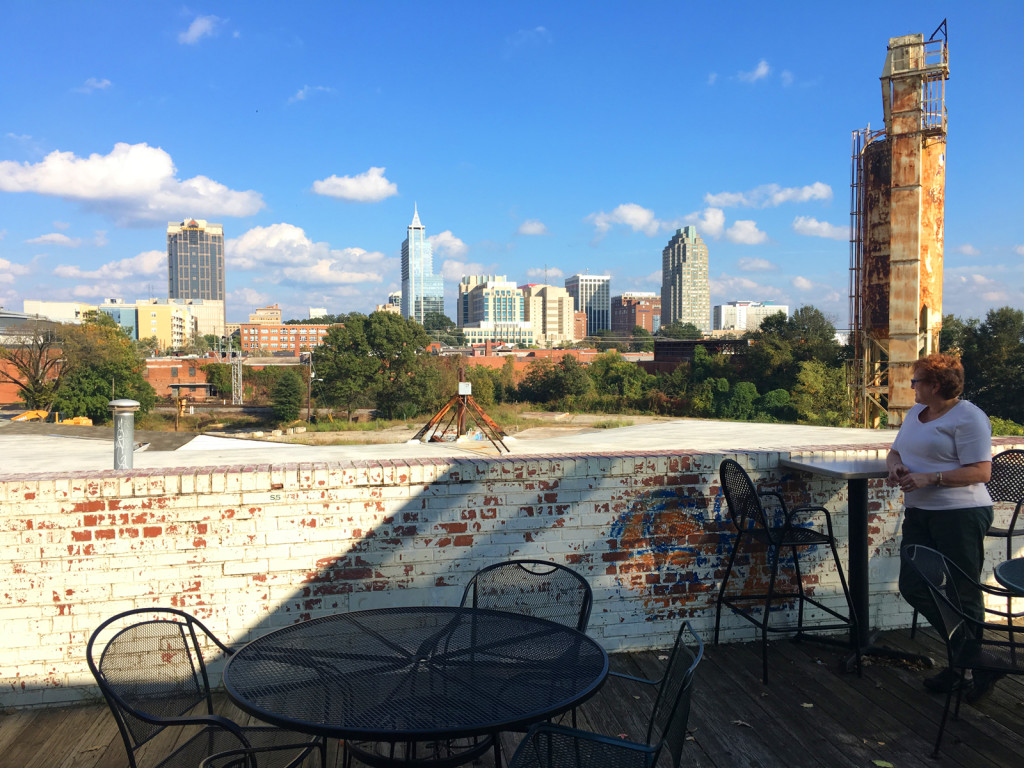Leaving home for college in 1977, Jill Warren Lucas knew how to make only one dish: Rice-a-Roni Spanish rice, with some ground beef mixed in.
Several careers later — newspaper journalist, public information officer, deputy press secretary for a state governor — Jill now has a reserved seat in the food writing community of Raleigh, North Carolina — itself rapidly rising as a national center of culinary attention. And starting a conversation with Jill on the Raleigh eating scene is to open a floodgate of food purveyor and chef recommendations, each name-dropped with feeling.
“Oh my gosh,” she was ecstatically telling me. “If you’re not hip to ‘Big Spoon Roasters’, you must get some peanut butter before you go home! You won’t believe it.”
I had to ask Jill again that we were in fact talking about an artisanal peanut butter shop.
“It’s fucking awesome,” she opined.
Jill is a food writer covering the Research Triangle region of North Carolina, for decades a vibrant hub of research and higher education. Corporations and organizations like IBM, Cisco, Lenovo, GlaxoSmithKline, SAS, and the National Institute of Environmental Health Sciences have major campuses sited among these oak and pine plains, nourished by neighboring academic powerhouses such as University of North Carolina, North Carolina State University, and Duke University. The region’s tech park even doubled as the headquarters of the fictional “Stark Industries” in one of Marvel Studio’s Iron Man films.
The Triangle is also where I lived for three years, resulting in my introduction to Jill.
Her husband, Tim, was and still is a media relations officer for the School of the Environment at Duke University, where I was completing my masters degree. Tim was a timely influence in my move towards a communications career — there’s nothing like hanging out with an affectedly sarcastic, cynically witty former newspaper reporter to get you curious about the trade. Journalists are basically grouchy hipsters with hearts of gold: nothing seems cool to them, because they’re the first know about everything before anyone else. And as such, they have an opinion about everything — along with some pretty hilarious gossip, too — though they prefer to commiserate over these secrets with fellow insiders, usually over a smoke or a drink.
But journalists gladly take on these personality quirks to sake their love for telling stories, for the craft of wordplay, and for the responsibility to bare truth to the world.
I had heard plenty of Tim’s stories, but I wanted to hear more of Jill’s — plus her thoughts as a food writer observing Raleigh’s rising riches.

I was visiting Raleigh for a few days in October, and Jill managed to squeeze in time to meet up with me, between her being on duty as a food judge for the North Carolina State Fair — getting “jam drunk” tasting this year’s entries in the Home Preservation category — as well as playing host at home to Tim’s mother Dotty, who was visiting.
Jill told me to meet her at a brewpub on Boylan Avenue, which turned out to have a patio that exhaled into a view of the downtown Raleigh skyline.
“When Tim and I met, and we were at Case Western Reserve, my hope at the time was that I wanted to write fiction,” Jill said, with a pint of ale in hand. “I was studying fiction. I was writing short stories.”
But Jill caught the journalism bug, and she started working for various community newspapers and regional magazines during those college days in Cleveland, Ohio. In the end, she earned a Pulliam Journalism Fellowship to intern at The Indianapolis Star newspaper. “It was supposed to be like nine-and-a-half weeks or something like that,” Jill said.
She wound up staying eleven years.
At the Star, Jill was assigned to the Arts and Entertainment section. Her first beat? Rock critic.
“You didn’t know that?” Jill said, responding to my surprised laugh. “I had, like, purple hair for a while. I was all into it,” she said, explaining how a home hair-coloring mishap unintentionally added to her work persona.
Married as college sweethearts who bonded over journalism, Tim joined Jill at the Star once it became clear her summer gig became a permanent job. Life was good. Jill and Tim were both successful as journalists. They had a little house, and had a son.
Indiana served its purpose to kick off their professional and personal lives, but eventually, the couple felt a need to move on. Her job took them to Indiana this first go around, so they decided he would get to pick their next destination.
In the end, the Research Triangle beat out Portland, Oregon.
“You know it was before the big whole explosion of everybody moving here,” Jill explained of their decision. “I remember thinking, it’s a small town, but they have a ballet, they have a symphony — it’s very civilized. It’s got the small downtown. There’s no traffic. I remember driving out here and being amazed that they would plant flowers and trees in medians. It just seemed like a nice place. It seemed friendly. It was affordable.”
And they found rewarding jobs. Tim launched his career as a media relations director, starting at North Carolina State University, while Jill found a job with the Sanford Herald before also crossing over to media relations. She first worked with the county school system, and then with the North Carolina state government — including time in Governor Mike Easley’s office — writing news announcements and tangoing and tangling with journalists on political issues and policies. “I think a lot of people don’t realize those are really pretty intense jobs,” Jill said. “They’re really pressure-filled.”
At home, the writerly couple would take their mind off of things over food.
Despite the jokes about her boxed-rice beginnings, Jill grew up around heartfelt cooking, as her suburban New Jersey childhood had been filled with Passover feasts and Jewish deli delights. Tim also cooked — and gardened, to boot — so by the time I got to know them, the duo were kitchen double threats. An evening visit to the Lucas household meant requisite tastings of handcrafted recipes from wife or husband, served with Emmylou Harris tracks cooing in the background.

By 2010, Jill had spent 15 years as a spokesperson in public employ. That summer, she also started a blog titled “Eating My Words” — where she would document her kitchen experiments and family cooking memories, as well as recipe inspirations she would sift from Triangle region or national news coverage.
It was a fortuitous decision. A few years later, circumstances of political and personal natures would end Jill’s streak as a North Carolina state worker. But by then, her blogging body of work was enough to prime her for a pivot towards a culinary writing career. Lisa Sorg, then-editor of the Indy Week newspaper, offered Jill her first freelance assignments writing food features. In a short time, Jill’s byline began to populate other Triangle publications and websites, at a rate that eventually eclipsed her personal blogging.
Between her published writing and her daytime sales gig at the Raleigh gourmet market “A Taste of Southern Seasons”, Jill Warren Lucas now became a name associated with Triangle food news.
“You know, I don’t discount that I did the work, but I really believe that I was so many times at the right place at the right time,” replied Jill, when I asked her about her unexpected path. “And people were very kind, and [they] connected me. And I did my best to take advantage of those situations and make good things happen. But, there are some enormously talented people around here.”
The Triangle has certainly benefited from that talent. The region’s gastronomic accolades include multiple James Beard award-winning chefs and frequent, adoring mentions by The New York Times food and travel writers.
I asked Jill why the Triangle has availed such a gourmand’s guild to evolve over the past decade.
“Wow, that’s really hard to say. You know, there’s a lot of people who have had very bold food ideas who are attracted to this area,” she began. “If you look, there’s a really great story that Kim Severson wrote for The New York Times a few months ago about how this area in general — and a little bit more about Hillsborough and Piedmont — that it’s a farming mecca, and that the resources here are extraordinary. That the growing season is long. People are taking this enormous pride in farmers and really maximizing those relationships.”
As for Raleigh itself, Jill credits a variety of elements. In 2006, the city government reopened a major street that it closed off to vehicle traffic in the 1970’s — to encourage pedestrian-friendly shopping, ironically. Commerce boomed in the years after the reopening. And from our patio perch, Jill pointed towards the skyline at buildings where tech companies like Citrix were setting up new offices.
“There’s a lot of young people,” Jill said. “There’s a lot of money coming downtown, so I think that really supports all those restaurants.”
And then there are the chefs themselves — the culinary entrepreneurs crafting this Carolina renaissance.
“All of these abandoned places are turning into fabulous, upscale, groovy places to go. It’s very exciting,” said Jill. “But you also have someone like Ashley Christensen, who, you know, gives back. And frankly, you’re going to have to do this if you want to get the James Beard Foundation’s interest. You have to do a lot of giving back to your community.”
Jill says Christensen, the 2014 James Beard Award recipient of Best Chef: Southeast, is a major supporter and participant with the Southern Foodways Alliance: “Because she feels this is so important — to lend her credibility to raising money for the preservation for important foodways. It’s incredibly cool to know that people are doing that. Using their celebrity in those kind of ways.”
Celebrity chef names cast casually in conversation. Come a long way from Rice-a-Roni dinners, Jill has.
“It’s still one of my favorite things. Sometimes I get wild and I throw in a can of black beans,” she laughed at the thought of hamburger-assisted instant meals. “But it’s kind of a comfort-food thing.”
Our patio visit was coming to a close. Dotty was waiting at home, and I, too, had to dash off elsewhere. There was much more I wanted to ask about — where the Black community fit into this changing sea of fine-dining fortunes, for instance — not an inconsequential question when examining a Southern city’s revival.
Even still, Jill had given me plenty of material to write from — ladles of news and commentary heaped upon a platter, for me to sort out and digest at my own pace — as expected from any conversation with former journalists.
“God, I don’t know what you’re going to do with this,” Jill laughed as we hugged goodbye.
As I walked back to my car, I thought about Jill’s college beginnings studying creative writing. At one point in our chat, she mentioned that these narrative skills have come full circle to benefit her craft, in her current incarnation as a food writer.
“I am telling stories — I just never imagined I’d be telling them in this kind of context? But I really think it all goes back to all the encouragement I had when I was in school, and those sorts of fiction techniques, applied to just sharing those stories,” Jill had said to me. “I think it’s a way to bring people into food, and to understand what food means to you culturally and economically — all those things it reveals about civilization and us as individuals.”
“Yeah, it’s exciting,” said Jill, of her own professional renaissance. “It’s nice to be able to do that. I never really imagined I’d be able to pull that off.”

CREDITS:
Story: Ben Young Landis
Photography: Ben Young Landis
